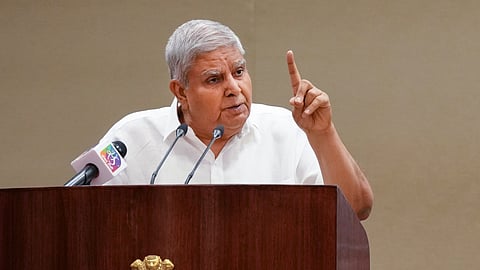

Calling Article 142 a “nuclear missile against democratic forces, available to the judiciary 24x7,” Vice President Jagdeep Dhankhar strongly criticised the judiciary, saying that there cannot be a situation where courts direct the President.
Article 142 of the Constitution gives the Supreme Court special powers.
The criticism came days after a landmark Supreme Court judgment that effectively set a deadline for the President and Governors to clear Bills.
His remarks were made in response to the Supreme Court’s April 8 judgment, which, for the first time, set a three-month deadline for the President to act on Bills reserved by state governors. The court stated that any delay beyond this period must be justified and urged state governments to coordinate with the Centre in such matters.
A bench comprising Justice JB Pardiwala and Justice R Mahadevan set an effective three-month deadline for the President and Governors to give assent to Bills passed by the legislature for a second time. The court also ruled that the President’s actions are subject to judicial review under Article 201 of the Constitution.
The Supreme Court further stated that only the judiciary has the authority to assess the constitutionality of a Bill, and the Executive should act with restraint in such matters. It also observed that when constitutional questions arise, it would be prudent for the President to refer the Bills to the Supreme Court.
The judgment came amid a constitutional standoff in Tamil Nadu, where Governor R.N. Ravi had delayed assent to several Bills, prompting the state government to take the matter to court.
In its ruling, the Supreme Court set aside the Tamil Nadu Governor’s decision to withhold assent to 10 Bills as "illegal" and "arbitrary". The court also clarified that if the President withholds assent, the state government retains the right to challenge the decision in court.
Dhankhar said that the President of India holds a highly elevated position and takes the oath to preserve, protect, and defend the Constitution.
"There is a directive to the President by a recent judgment. Where are we heading? What is happening in the country? We have to be extremely sensitive. It is not a question of someone filing a review or not. We never bargained for democracy for this day," Dhankhar said, addressing the 6th batch of Rajya Sabha interns at the Vice-President’s Enclave.
"President being called upon to decide in a time-bound manner, and if not, becomes law. So we have judges who will legislate, who will perform executive functions, who will act as super-parliament, and absolutely have no accountability because law of the land does not apply to them," he added.
"We cannot have a situation where you direct the President of India, and on what basis? The only right you have under the Constitution is to interpret the Constitution under Article 145(3),” he further remarked.
Stressing the principle of separation of powers, he underlined, “When the Executive - the government - is elected by people, the government is accountable to Parliament, the government is accountable to the people at elections. There is a principle of accountability in operation. In Parliament, you can ask questions, critical questions, because the governance is by the Executive. But if this Executive governance is by judiciary, how do you ask questions? Whom do you hold accountable in an election?”
“Time has come when our three institutions - legislature, judiciary, and executive - must blossom. And they blossom best, and best for the nation, only when they operate in their own area. Any incursion by one in the domain of the other poses a challenge, which is not good,” he said.
He also criticised the court for inaction regarding the recent incident in which a huge pile of cash was found inside the bungalow of Delhi High Court judge, Justice Yashwant Varma.
“An event happened on the night of 14th and 15th of March in New Delhi, at the residence of a judge. For seven days, no one knew about it,” he said.
He questioned whether such a delay was justifiable or acceptable, and whether it raised fundamental concerns.
The Vice-President said no FIR has been filed against the judge after the cash haul.
"The Constitution of India has accorded immunity from prosecution only to the Honourable President and the Honourable Governors. So how come a category beyond law has secured this immunity?” he questioned.
Mr Dhankhar said any investigation is the domain of the Executive and questioned why a committee of three judges was examining the cash haul case.
He said over a month has passed since the cash haul. "It has now been over a month. Even if it is a can of worms. Even if there are skeletons in the cupboard, it's time to blow up the can. Time for its lid to go out. And time for the cupboard to collapse. Let the worms and skeletons be in the public domain so that cleansing takes place," he said.
Stressing the need for a proper investigation, Dhankhar criticised the slow pace of developments, saying that if such an incident had occurred at his residence, the response would have been immediate. He called for transparency, stating that “even if there are skeletons in the cupboard,” the time had come for the truth to be exposed so that institutional cleansing could begin.